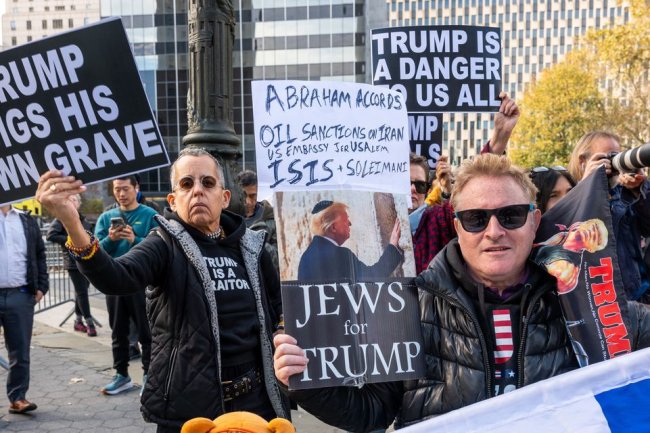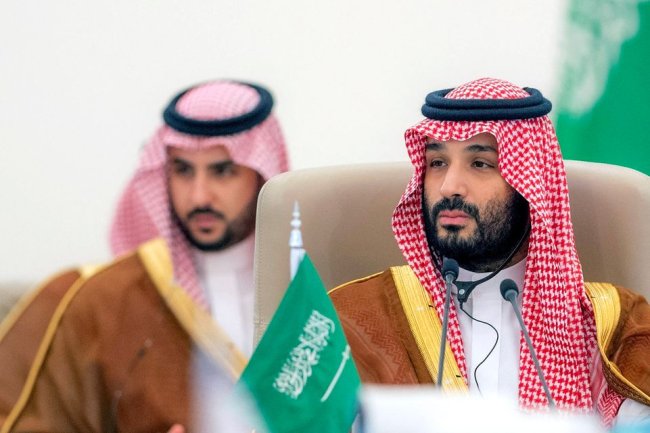Niger Coup Upends U.S. Security Plans in West Africa
Several countries have ousted leaders, making it tougher for Washington to counter al Qaeda and Islamic State A group of military officers in the West African country of Niger said Wednesday they had seized power and removed the country’s elected President Mohamed Bazoum. Photo: AFP/Getty Images By Michael M. Phillips , Benoit Faucon and Drew Hinshaw Updated July 27, 2023 3:43 pm ET NAIROBI—This week’s military coup in Niger threatens to disrupt the entire U.S. strategy for fighting Is

A group of military officers in the West African country of Niger said Wednesday they had seized power and removed the country’s elected President Mohamed Bazoum. Photo: AFP/Getty Images
NAIROBI—This week’s military coup in Niger threatens to disrupt the entire U.S. strategy for fighting Islamist militants as they expand across western Africa, and potentially hand Russia a strategic advantage as it tries to widen its own influence in the region.
The centerpiece of the U.S. approach to regional security has been dispatching American commandos to train elite local forces to take on al Qaeda and Islamic State, whose violent ideology has spread rapidly from the Middle East and South Asia into the Sahel, the semiarid band south of the Sahara, over the past six years.
Now, with the dust still settling after military officers ousted Niger’s President Mohamed Bazoum on Wednesday, the U.S. finds itself constrained by American law that prohibits it from providing most security aid to military regimes. And with the Nigerien Armed Forces saying Thursday they backed the revolt, the worry in Washington is that the coup leaders risk ceding more ground to the militants after splitting with the U.S., and could turn instead to Russian mercenaries to help them fight back.
Bazoum, who was elected to office in 2021, had been a bedrock ally in the U.S. campaign. The vast West African country hosts American drones and American commandos, who have trained Nigerien special forces and advised them during combat missions against Boko Haram and local affiliates of al Qaeda and Islamic State. Four American soldiers died in an Islamic State ambush in Niger in 2017.

Supporters of Niger’s president gathered in the capital, Niamey, this week amid a military coup.
Photo: Agence France-Presse/Getty Images
The U.S. has spent more than $500 million since 2012 to build up and train its armed forces. The European Union pledged 1 billion euros in aid to Niger, which in turn choked off the flow of migrants heading north toward Libya and the Mediterranean.
Coups in Burkina Faso and Mali over the past two years have already hamstrung U.S. military assistance to the region; American appropriations law sharply limits aid to armies that have overthrown civilian governments. Although State Department lawyers haven’t declared events in Niger a coup d’état, such a move seems likely.
After seizing power, militaries in both Mali and Burkina Faso ousted troops from France, the former colonial power in much of West Africa. Mali hired hundreds of Russia-linked Wagner Group fighters, who have been accused of massacring civilians and pillaging the country’s natural resources.
“Niger is the last domino that we hope doesn’t fall,” said a senior U.S. intelligence official. “If it falls, I don’t exactly know what you’re going to do.” The official said Niger was the “last major footprint” in the Sahel for U.S. and French forces.

American commanders are worried the coup will embolden militants, particularly from al Qaeda, who have launched thousands of attacks in Mali, Niger and Burkina Faso since 2017 and are now pressing south into northern areas of Ivory Coast, Togo and Benin. U.S. and Ghanaian officials worry militants also have their eye on Ghana, a regional economic and political powerhouse with a large Muslim population in its relatively poor north.
“The political instability in Niger remains a major concern,” said a senior military officer from Benin, a coastal country whose northern reaches border both hard-hit Burkina Faso and Niger. “From now on, we might face increasing activity by terrorist groups along our common border.”
While U.S. officials held out vague hope Thursday that the Niger coup might yet be reversed, evidence from the ground suggests Bazoum’s ouster was final. The junta faced limited opposition from loyalist segments of the army, but now has the upper hand, said former senior Niger and European officials briefed on the coup.
In a statement circulated Thursday, the Nigerien Armed Forces said its top officers decided to support the revolt to “preserve the physical integrity of the president and his family and avoid bloody confrontations” between branches of the armed forces, said Gen. Abdou Sidikou Issa, a military spokesman.
Col. Maj. Amadou Abdramane, a spokesman for the coup plotters, said in a televised announcement Thursday that all political parties had been suspended. He also accused France of violating an order to close the country’s airspace by landing a military aircraft at the capital Niamey’s airport. Many of the foreign troops in Niger, including some of the 1,100 U.S. soldiers based there, are stationed on the military side of the airfield, called Air Base 101.

Col. Maj. Amadou Abdramane, a spokesman for the coup plotters, spoke during a televised appearance.
Photo: ORTN/via REUTERS
The senior U.S. intelligence official suggested that Niger’s military may still want close cooperation with the West. But, given the restrictions imposed by U.S. law, the uprising seems likely to drive a wedge between Washington and Niger.
“It’s a massive blow to the U.S.,” said Cameron Hudson, former chief of staff to the U.S. special envoy for Sudan. “We have vouched for this leader like no other in the region.”
President Biden gave Bazoum a seat of honor next to him at last year’s U.S.-led summit with African leaders in Washington. Secretary of State Antony Blinken
visited Niger in March to announce $150 million in humanitarian aid in what U.S. diplomats described as an attempt to showcase the benefits of choosing the U.S. over Wagner.A post-coup break with the West could give Moscow a chance to step in with weapons and mercenaries, the way it has in Mali, according to analysts.
“Niger is now in play,” said Hudson, now a senior associate at the Center for Strategic and International Studies in Washington. “It went firmly from the Western camp to a model for Russian opportunism.”
Russian Foreign Minister Sergei Lavrov said the coup against Bazoum was unconstitutional. “In such cases, we always take a clear position,” he said in comments posted on the ministry’s website.
Brig. Gen. Moussa Salaou Barmou, commander of Nigerien special forces and a trusted ally of the U.S. military, was among the senior officers who appeared in public in Niamey, the capital, to show support for the overthrow. Gen. Barmou didn’t respond to requests for comment.

Niger’s president, Mohamed Bazoum, at a gathering in Paris last month.
Photo: LUDOVIC MARIN/PRESS POOL
U.S.-trained troops in Guinea, Mali and Burkina Faso turned on civilian governments in those countries, as well.
“The U.S. strategy does not help the Sahel nor the U.S. itself,” said Prof. Emmanuel Kwesi Aning, head of the Kofi Annan Peacekeeping Training Centre in Accra, Ghana.
Officials said the uprising—the fifth such coup since Niger became independent from France in 1960—reflected years of frustration inside the army over the failure to defeat Islamist insurgents. Officers were also upset over Bazoum’s attempts to reform the military. In one move in June, his government appointed Salifou Modi, the head of the Nigerien Armed Forces since 2020, ambassador to the United Arab Emirates. On Thursday, social-media users speculated Modi, who couldn’t be reached, would now emerge as leader of the junta.
Another trigger for the coup was Bazoum’s decision to reduce the financial perks of the presidential guard—the force that spearheaded the uprising by blockading the president in his residence, a former European official said. For more than a year, the president had been weighing whether to dismiss the unit’s commander, Gen. Omar Tchiani. Bazoum had also been building up other military units as a counterweight to the power wielded by the presidential guard.
As the standoff at his residence escalated into a coup attempt, Bazoum fielded a phone call around noon on Wednesday from a former U.S. official who retains regular contact within U.S. diplomatic and security officialdom. In that call, Bazoum reassured his American contact that the situation remained under control and that he expected the army to soon arrive at his residence and dismantle the blockade.
Instead, the country’s top generals came out in support of the revolt. “It was bound to happen,” the former European official said of the uprising. “Nobody is surprised.”
For more than a year, U.S. and European officials have worried about what they call a wave of disinformation on West African social-media networks. In one months-old video, viewed more than a million times on TikTok and Facebook, a French news anchor announced a coup was under way in Niger; the comments are overwhelmingly anti-French, accusing the president of being a puppet of the West.
Other viral videos showed terrorist attacks in an effort to make the case that the U.S. presence in Niger made the country less secure. Last year, a few thousand Nigeriens, some carrying Russian flags or pro-Russian placards, marched through the streets of Niamey, demanding that the French army leave.
“That Russia had a hand not necessarily in the coup itself, but in laying the groundwork for it, is pretty evident,” said J. Peter Pham, a former senior U.S. diplomat in Africa. “Whether they’re in a position to exploit it, that’s a different question.”
A White House spokesperson said the administration had no evidence that Russia or Wagner Group was behind the coup.
—Ann M. Simmons contributed to this article.
Write to Michael M. Phillips at [email protected], Benoit Faucon at [email protected] and Drew Hinshaw at [email protected]
What's Your Reaction?

















